Tetsuo II: Body Hammer (1992)
Directed by: Shinya Tsukamoto
Written by: Shinya Tsukamoto
Starring: Nobu Kanaoka, Shinya Tsukamoto, Tomorowo Taguchi
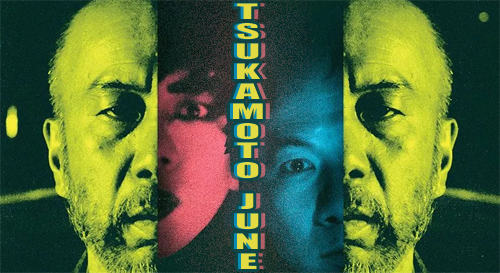
TETSUO II: BODY HAMMER (1992) Available on demand and from Third Window Films
Welcome to the machine. Oh and welcome back Tsukamoto fans. It’s time to enjoy some zany action and some over-acting, in the first of two sequels to Tetsuo: The Ironman. The black and white photography has been replaced by harsh primary colours. The budget seems to be generally higher. And it’s not a continuation of the previous movie, so anything goes. However, there is also the problem with diminishing returns to consider. Being tied to an existing idea means that this is more of a redux than anything fresh and exciting. On paper it should be a kind of Evil Dead II scenario, but it doesn’t quite work out. Which is odd considering this is the film I’ve watched most often in the director’s catalogue. Let’s cut open the mechanical innards and see why.
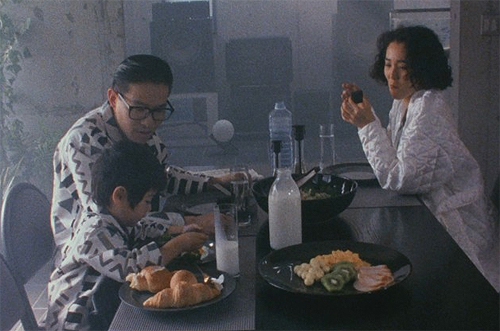
Body Hammer is a fun and entertaining movie. It looks cool and has a lot of strange sequences. The blue glass of city buildings contrasts against the vibrant reds of molten steel. It’s a story that gives the idea of pumping iron a whole new meaning; an action flick all about the difference between cool exteriors and boiling internal rage. However, after the grunge of the opening finger banging scene it becomes more pedestrian. The locations are fairly striking but it’s recognisable as a real city in a lot of the scenes. The wild energy and raw electrical power of the original feature has been insulated. The manic pace is slowed down to allow for a standard storyline about a family in peril. It doesn’t end in a standard fashion of course, but a lot of the plot points are familiar.
Characters even have names and back-stories this time around. Taniguchi (Tomorowo Taguchi) is another bespectacled everyday guy, now with a wife Kana (Nobu Kanaoka) and a son Minori (Keinosuke Tomioka). Although naming the characters so closely to the names of the actors suggests its not important. It’s just a minor change from naming them ‘salary man’ and ‘woman’ and like the rest of the movie it’s only a small deviation. Taniguchi’s family time is disrupted when a gang kidnaps Minori at a record store. But after rescuing the boy he doesn’t try and prevent this happening again, or get anyone to help stop the criminals. Instead he just half-heartedly goes to a gym, apparently taking it all on himself. Which of course doesn’t work so their lives become even worse. Things can never be the same again, in more ways than one.
Simple melodrama replaces any kind of outrageous narrative, and soon it’s revealed the crooks are a gang of bald muscle-men working for Yatsu (Shinya Tsukamoto). He’s apparently looking for ways to turn men into killing machines, although perhaps they already are. After more failure, Taniguchi finds himself attached to a machine in a sweaty underground lair. Here Yatsu’s personal mad scientist conducts a series of bizarre experiments. Plugged into a device that can record dreams, they see the emotional mechanisms that will turn a simple man into a cyborg monster. The imagery is somewhere between Weapon X and The Incredible Hulk. Which is to say, this is part metal nightmare and part superhero origin… recognisable elements that stop it from being truly exciting.
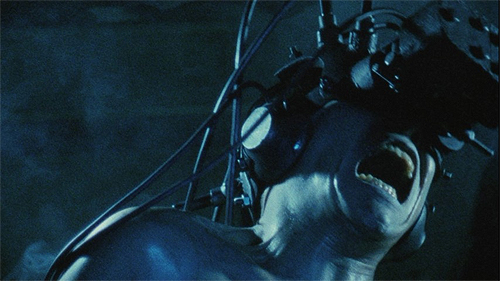
Yatsu (sporting a series of different hairdos) has a strange unexplained plan at least. A great sports montage sees his minions do various types of exercise to maximise their vague powers. There’s a whole surreal set piece involving characters having their brains connected, as a series of images involving cells and molecules flashes by. But some of it is laid out like a regular action movie, with flashbacks to tragedy and twists about past connections. Taniguchi was apparently adopted at eight years old, at which age he got amnesia, which of course leads to other plot revelations. As a result some ideas get less interesting as things progress, when more context is added. Some of the ingredients are still fresh – guns and sex, family and technology, willpower and metamorphosis – but others are just shoot outs and chases.
To be fair, the transformation between man and armoured vehicle is inventive. There’s even some stop motion along the way, to retain the original style. Chu Ishikawa’s score sounds like something from Sega’s 16-bit era, which is fun. But it’s still just a tale of kidnapping and revenge. Guns and car chases are standard stuff, even if the guns look like something out of Videodrome. The engaging elements are kernels of intrigue that consider peace through total destruction, and rebirth through death. It leans into mind-melting imagery here and there, but never totally commits to it. If Kana had more to do besides giving looks of horror, perhaps it would be more of a family affair. After all, the question of whether family can exist in a harsh modern world is a potent one. Tsukamoto seems to think the answer is no.
Perhaps this is all just because it’s a half way stop between the experimental craziness of Tetsuo, and fully formed character study that would come next. All the director’s later features share the same DNA shrapnel which has been lodged here. The original movie didn’t need to explain why the antagonist had such odd fetishes. We didn’t need to know who his father was. Or where the power to merge flesh and steel came from, since the flashbacks were mostly surreal. But when your story is directly about rivalries and existential crises, like in Tokyo Fist, then more development is better. The battles are more fascinating when they’re internal, instead of just being a lot of pyrotechnics. Which means that this is a building block on the way to greater things, even if it’s still pretty watchable techno-nightmare. If you’re a twisted cyberpunk fetishist yourself that is.
Further Reading:




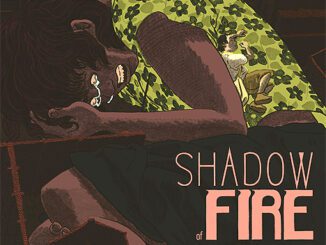
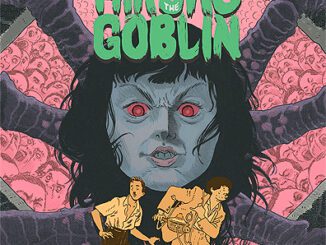

Be the first to comment